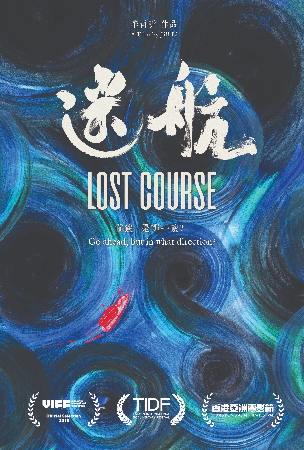
Lost Course 2019
Distributed by Icarus Films, 32 Court St., 21st Floor, Brooklyn, NY 11201; 800-876-1710
Produced by Peter Yam
Directed by Jill Li
, 180 mins
Middle School - General Adult
Activism; Communism; Democracy
Date Entered: 02/21/2022
Reviewed by Jaquair L. Gillette, Actor/Filmmaker/Library PatronIn the opening scene we are welcomed with the rumblings of two individuals trying to start a boat on water. We come to the conclusion of the film in the same manner. As the film starts the both Chinese and English writings appears on the screen to set the backstory of emerging film director Jill Li’s film Lost Course. In that backstory we are given the circumstances of the land of the Wukan villagers in China having their lands taken by developers without notice. Protests emerge with people shouting, ‘Down with Corrupt Officials,” who they blame for selling their land to developers. The villagers put up roadblocks to stop the developers and officials from coming in and negotiating.
The Villagers decide to do grassroots organizing to democratically elect new representatives of the village. After the murder of one of the organizers named Bo, the remaining organizers build support to win election promising to return the lands to their people. After using democracy as a tool to take control over their village they find themselves faced with push back from higher levels of the Communist Party, the complexities of governing, and the same corruption that has plagued them. In the aftermath many of the original organizers were jailed for various alleged reasons along with many other villagers and given extensive prison sentences. One organizer fled years earlier to the United States and even sought support for the Wukan cause only to receive news that his father, family, and other villagers found themselves imprisoned.
Jill Li and her team display the raw life and reality of the Wukan Village. Not only using footage that the team captured but even that of the villagers during protests. Using great stand stills to highlight the agricultural and impoverished landscapes makes the viewer aware of the world they are entering. Using these techniques displays more of the life and struggles of the Wukan Villagers. Most people outside of China did not and currently do not know the life of villagers in China. The HD cameras that were used gave you a glimpse and feel that was natural. Capturing the messy complexities of democracy in a country where Communism/socialism rules is quite astounding.
My only setback for this documentary is that it is way too long. I understand that it runs over the course of several years, from 2012-2016, but at certain parts it felt a bit dragged. Too much footage was used to cover this story and could have been cut down a bit to convey it. Some would think that the technical scopes (camera footage) will come across a bit dated, but I believe it is due to the fact that when they started filming it was state of the art for that time and should not be held against the filmmakers, especially since it gives such a raw feel.
Lost Course, is a film best suited for those who are exploring the studies in international studies, international politics, forms of government, and other disciplines dealing with agriculture and land rights etc. One of the most profound statements in this film was by Mr. Lin, one of the original organizers and director of the committee who stated, “That all conflicts are based on money.” In this documentary the viewer sees the degrees of truth in that statement even in Communist China.
Awards: Golden Horse Festival 2020, Best Documentary; Open City Doc Fest 2021, Emerging International Filmmaker Award; Taiwan International Documentary Film Festival 2021, Asian Vision Competition; Chinese Documentary Award, Taiwan Film Critics Society Prize
Published and licensed under the Creative Commons Attribution 4.0 license. Anyone can use these reviews, so long as they comply with the terms of the license.